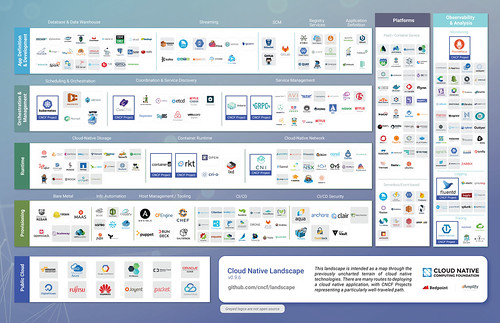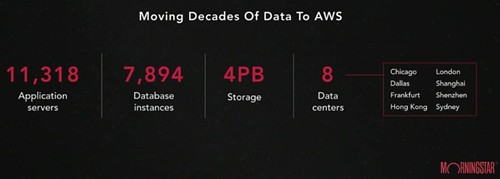Stuff The Internet Says On Scalability For September 15th, 2017
 Friday, September 15, 2017 at 9:03AM
Friday, September 15, 2017 at 9:03AM Hey, it's HighScalability time:

If you like this sort of Stuff then please support me on Patreon.
- 12.9 million: DynamoDB requests per second on Prime Day; 4 billion: transistors on Apple's A11 Bionic chip; 4x: extreme weather events since 1970; 51: qubit device; 50%: Messenger.com converted to Reason; 56.6 million: US cord cutters; 5000: bikes abandoned at Burning Man; 500 million: yearly visitors to Apple stores; 30 min: time to send one HD color image from Mars to Earth;
- Quoteable Quotes:
- @randyshoup: Interesting idea of a *Negative* MTTR by @adrianco: notice something is going to fail and proactively fix it before it breaks!
- @rob_pike: "The Equifax executives who let my data be stolen will probably suffer fewer consequences than I will for an overdue library book." @nytimes
- @avantgame: on weaponized social media: "We’re in an information war with Russia. It’s time we started acting like it."
- Jamie Dimon: It's [Bitcoin] worse than tulip bulbs. It won't end well. Someone is going to get killed
- @manisha72617183: First they tell you that Scrum is not a magic bullet.Then they spend the rest of the time saying how it’s the best thing since sliced bread🙄
- yogthos: My team has been using Clojure for 7 years now, and we're very happy with it. It's still a pleasure to work with, and the stability of the language has been really welcome.
- @GossiTheDog: Another way of looking at Equifax is they did an incredible job of keeping infrastructure that size with that much legacy secure for so long
- API Evangelist: when it comes to the shear volume, and regular drumbeat of serverless stories Microsoft is keeping pace. After watching several months of sustained storytelling, it looks like they could even pass up Amazon in the near future.
- amelius: Well, I hear a lot of people complaining that the results on DuckDuckGo are still worse than on Google, even though both search-engines produce results within a second. And these are people that really want to quit using Google for privacy reasons. I never hear people complaining that a search is slow. So I do think that search-quality is where the competition is happening.
- @SwiftOnSecurity: How you think multinational hypercorps get hacked: NSA 0days on the black market How multinational hypercorps get hacked: admin/admin
- m-masa: Snapchat to me is sharing your shaky drunken escapades at 3AM with your friends to let them know you made it home and survived the night. Instagram seems more like an endless observation of copy-and-paste, superficial things and people and places. It's evolved more into a (usually inaccurate) portrayal of status than anything else.
- Dmitri Zimine: When Serverless replaces micro-services, it is not going to be free lunch either. We are paying by introducing more complexity, now for the benefit of massive cost savings.
- Kris De Decker: In London, a solar panel produces 65 times less energy on a heavy overcast day in December at 10 am than on a sunny day in June at noon
- nostrademons: The real interesting work in search is in ranking functions, and this is where nobody comes close to Google. Some of this, as other commenters note, is because Google has more data than anyone else. Some of it is just because there've been more man-hours poured into it. IMHO, it's pretty doubtful that an open-source project could attract that sort of focused knowledge-work (trust me; it's pretty laborious) when Google will pay half a mil per year for skilled information-retrieval Ph.Ds.
- rkangel: Up to now this is all classic Eve - betrayal by people you trust. The postscript is less nice though: gigx in a moment of anger asked in in game chat for real life contact details for TheJudge so that he could 'cut off his hands'. This is obviously not OK and CCP banned gigx permanently. This has the side-effect of putting the final nail in the CO2 coffin.
- Rick Altherr: At one point I did that calculation and I was seeing one hard drive die every five minutes.
- EliE: the fundamental reason why ransomware is so successful, and here to stay, is that people simply don’t backup their data.
- EliE: no matter how many times the bitcoins are moved, ultimately they must be cashed out at exchange points. So we just need to keep tracing movements until we reach a cash-out wallet.
- @radjanirad: Just a few hours ago, Cassini received the command to turn off the RADAR instrument - for the last time. :( #cassini
- @postwait: Most monitoring "innovations" have been mostly aesthetic, but their marketing is deafening and drowns out real innovation. #UphillBattle
- pab: I have two years experience pair programming, and to quote asthasr, I found it an absolute slog.
- @matthew_d_green: I have an idea. Let's combine all the hard parts of cryptography with all the asshole parts of the finance industry.
- Pete Saia: It’s important to understand that it isn’t all or nothing. Serverless is in our future, but it isn’t our exclusive future.
- Errata Security: The 9,000 devices were split almost evenly between Apple and Android. Almost all of the Apple devices randomized their addresses. About a third of the Android devices randomized. (This assumes Android only randomizes the final 3 bytes of the address, and that Apple randomizes all 6 bytes -- my assumption may be wrong).
- David Rosenthal: Today's eclipse records would be on the Web, not paper or bone. Will astronomers 3200 or even only 580 years from now be able to use them?
- Peter Zaitsev: To be competitive with non-open-source cloud deployment options, open source databases need to invest in “ease-of-use.” There is no tolerance for complexity in many development teams as we move to “ops-less” deployment models.
- Jeremy Hsu: the advantage of the flip-flop qubit comes from inducing an electric dipole—separation of positive and negative charges—by pulling the electron a little bit away from the nucleus of the phosphorus atoms (which are themselves embedded in silicon). That electric dipole enables the spin-based silicon qubits to remain entangled together over longer distances and able to influence one another through quantum physics.
- Cory Doctorow: All these forms of cheating treat the owner of the device as an enemy of the company that made or sold it, to be thwarted, tricked, or forced into conducting their affairs in the best interest of the company’s shareholders. To do this, they run programs and processes that attempt to hide themselves and their nature from their owners, and proxies for their owners (like reviewers and researchers).
- Jonathan Golden: How do you know, though, when to pull resources away from other growth initiatives to address these edge cases? My rule of thumb was when a problem was occurring at least 50 times a day, it was time to solve it more holistically. At a time when we were growing anywhere from 300%–600% per year — and edge cases were growing at least as fast — that’s when the potential explosion of problems proliferated.
- A Mind at Play: Well, the good of this command is that if you’re in a loop you can have this command in that loop and every time it goes around the loop it will put a pulse in and you will hear a frequency equal to how long it takes to go around that loop. And then you can put another one in some bigger loop and so on. And so you’ll hear all of this coming on and you’ll hear this “boo boo boo boo boo boo,” and his concept was that you would soon learn to listen to that and know whether when it got hung up in a loop or something else or what it was doing all this time, which he’d never been able to tell before.
Don't miss all that the Internet has to say on Scalability, click below and become eventually consistent with all scalability knowledge (which means this post has many more items to read so please keep on reading)...




















